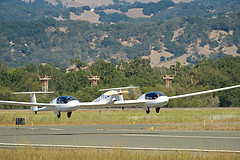
UNIVERSITY PARK – A Penn State Engineering team led by Jack W. Langelaan, assistant professor of aerospace engineering, took home first place and $1.35 million in prize money in the Comparative Aircraft Flight Efficiency (CAFE) Foundation Green Flight Challenge held on Nov. 4. This is the largest prize ever awarded in aviation history, according to the agency.
The contest, held in Santa Rosa, Calif., challenges teams to design and build an electric aircraft capable of flying at an average speed of at least 100 mph over a 200-mile course while achieving a fuel efficiency greater than 200 passenger miles per gallon equivalent.
“Two years ago the thought of flying 200 miles at 100 mph in an electric aircraft was pure science fiction,” Langelaan said in a NASA press release. “Now we are all looking forward to the future of electric aviation.”
The goal of the contest is to inspire the development of more fuel-efficient aircraft and spark the start of a new electric airplane industry.
“Current general aviation aircraft fly at about 60 passenger miles per gallon,” said George Lesieutre, professor and head of aerospace engineering. “The 200-mile flight is significant for electric aircraft, which until now have been limited in either speed or endurance and range.”
Fourteen teams originally registered for the competition and only three teams successfully met all requirements and competed in the skies above the Charles M. Schulz Sonoma County Airport.
This week’s contest marks the culmination of more than two years of aircraft design, development and testing for the teams.
Langelaan led Team Pipistrel-USA.com. Pipistrel is a Slovenian manufacturer that supplied a four-seat, electrically powered aircraft based on their Taurus G2 self-launching sailplane.
The team achieved the equivalent of 403 passenger miles per gallon at an average speed of 107 mph during the contest. Langelaan said, “This is twice the fuel efficiency of a Toyota Prius at twice the speed!”
Langelaan was responsible for real-time optimization of flight path and speed. The team combined its electrically powered aircraft with advanced route planning and pilot aids to achieve high flight performance.
More information on the team, including videos, can be found on Pipistrel’s blog at www.pipistrel-usa.com/blog1. Information on the contest can be found at www.cafefoundation.org.
The contest was managed by the CAFE Foundation through a NASA agreement and sponsored by Google.
Curits Chan, Penn State University


